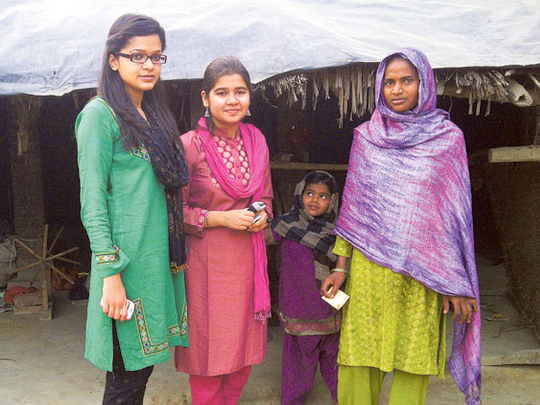
New Delhi: At 22, Bano Fatima has received the HP Life Entrepreneurship Award at New York’s Global Citizen Festival.
The Indian won the award thanks to her initiative of engaging handloom weavers of Baragaon village in Barabanki, Uttar Pradesh, with the aim of fighting the social discrimination and economic exploitation experienced by the artisans.
Fatima launched Weaver’s Hut, a small-scale enterprise that teaches lifes skills and offers a forum where weavers can sell products in major cities.
In order to help them, Fatima did the HP Life training to first hone her own technical and communication skills.
Fatima was accorded the prize after her entrepreneurship story received the most online votes. The award includes $5,000 (Dh18,365) and a trip to New York.
She speaks to Gulf News.
How did the online votes work, on the basis of which you bagged the award?
Over the years, HP Life has made documentaries of inspiring entrepreneurs from their course around the world. I shot one of those in 2011. And in 2013, they shortlisted documentaries of five entrepreneurs for online voting, which lasted for a month. I was lucky to get the maximum votes.
How has the prize money benefited you and the weavers?
We are currently working out strategies to see where and for which programmes to use the prize money. We intend to roll that out by March.
In what way has the trip to New York exposed you to take new initiatives?
The trip was a wonderful experience. Besides being in the lovely city, I met a lot of interesting people from the developed world. And interacting with people from Global Citizen about the work they are doing in Uganda was inspirational. Since I am doing my masters in the UK, I have not been able to go back to work in India. However, this experience has definitely helped me to come up with innovative ideas that I can implement through my work.
What led you to do your Masters’ in Development Studies at the Institute in Sussex?
Given my parallel experiences as a social entrepreneur, I strive to cultivate a solution-based understanding of development. It was my earnest aspiration to study at the Institute because of its excellent faculty and cutting edge research in development.
How and why did you choose to help rural artisans in this particular Baragaon village in Barabanki?
In my second year of undergraduate studies at Delhi University in 2010, I did a course run by HP Life and Dhritii Foundation on entrepreneurship. Inspired by that, my cousin Nabila Kidwai, who is the co-founder of Weaver’s Hut, and I, spent a lot of time in Barabanki interacting with people in the handloom weaving community. Since Baragaon is our hometown, we were especially attached and encouraged to work with people there. With a desire to reach out to them and enable their holistic development, we founded Weaver’s Hut. Our target group was handloom-weaving families below the government prescribed poverty line.
During the course of your work, what aspect of the handloom sector has been an eye-opener for you?
We realised that the handloom sector in India employs the second largest number of people in the rural workforce. Our numerous visits to Baragaon made us aware of the social and economic circumstances of the villagers. The exploitation and harsh working conditions they were experiencing were especially striking. Poverty and economic disempowerment, inadequate incomes have had a significant trickledown impact, especially on education and personal life skills. As a result, this increased the rural to urban migration in search of work.
The direct consequences of globalisation and monopoly of machine-made goods further pose a severe threat to the handloom sector. This is compounded by caste hierarchy, which has affected several communities. There are also broader, systemic and structural issues, such as poor infrastructural development, unaccountable bureaucracy and inefficient policy implementation.
How many families are you helping out at the moment?
We are currently working with five families and each has about five to six members. Our target is to gradually increase the number of families and then spread out to more villages. We are also working with Rafi Ahmad Kidwai School for Girls in Masauli, Uttar Pradesh, under our project Umeed, to promote and encourage higher education for girls.
What visible change have you seen among the weavers since you began working with them?
Though we have not conducted any official assessment of our social impact yet, I have noticed an increase in efficiency of the weavers. They take on work more willingly. The living standard of some families also seems to have improved from when we first met them. All the families are now sending their children to school and some of them for further studies.
What led you to take up social causes so early into adulthood?
Born and brought up in India, I have witnessed the implications of development and globalisation in the developing world. My mother’s work at the United Nations High Commission for Refugees was inspirational. Even in my extended family, a lot of people work in the social sector and the stories of their experiences have impacted me.
Have you worked with other organisations also?
My social consciousness was honed through a year-long experience as a volunteer in 2009 with the Prajna Foundation, which works with slum dwellers in New Delhi. I worked as a tutor and counsellor for women and children. This allowed me to witness the absence of basic human rights on the streets of urban India. Soon after, I worked with several policy analysis and social volunteering organisations such as PRS Legislative, Ministry of Rural Development and HAQ: Centre for Child Rights.












